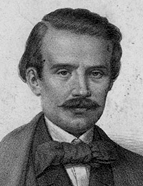

Latino Coelho also produced other studies that, although minor, set him apart among 19th-century historians. One example is his biographies of Camões and Vasco da Gama. In these two historical figures, Coelho saw ideal embodiments of "citizens of humanity" (Vasco da Gama, Vol. I, p. 21). An ecumenical ideal of fraternity and unity among peoples permeates his works, reflecting his alignment with the republicanism to which he adhered. Perhaps this is why he prioritized these figures in his project for the Galeria de Varões Ilustres de Portugal [Gallery of Illustrious Men of Portugal], which was to be published by David Corazzi. The goal was to inspire admiration for heroes and benefactors of humanity who had excelled in various fields. This project shows a clear positivist influence, especially when it attempts to explain national destiny by referencing a "fatal and necessary law" that claims all peoples living on narrow seashores become "fearless adventurers" (as with the Phoenicians, Portuguese, or Dutch) (Vasco da Gama, p. 72).
Additionally, there is a cultural nationalism rooted in Portugal's history of resisting external threats. This doctrinal influence is evident in his interpretation of Os Lusíadas, where he emphasises the poem's defence of the people and its critique of 16th-century monarchs and high-ranking officials as key elements (Luiz de Camões, 1880, pp. 174–175). Latino Coelho also translated plays by the popular French author Victorien Sardou. The plays he translated include the five-act comedy Les vieux garçons, staged as Solteirões at the Príncipe Real and D. Maria II theatres, as well as the four-act comedy Les Ganaches, staged as Caturras at the D. Maria II theatre. On 11 December 1898, a formal session was held at the Royal Academy of Sciences, during which a historical tribute was paid to Latino Coelho. Speeches were delivered by Tomás Ribeiro and Sousa Monteiro, with King Carlos, Queen Amélia, and Infante Afonso in attendance.
